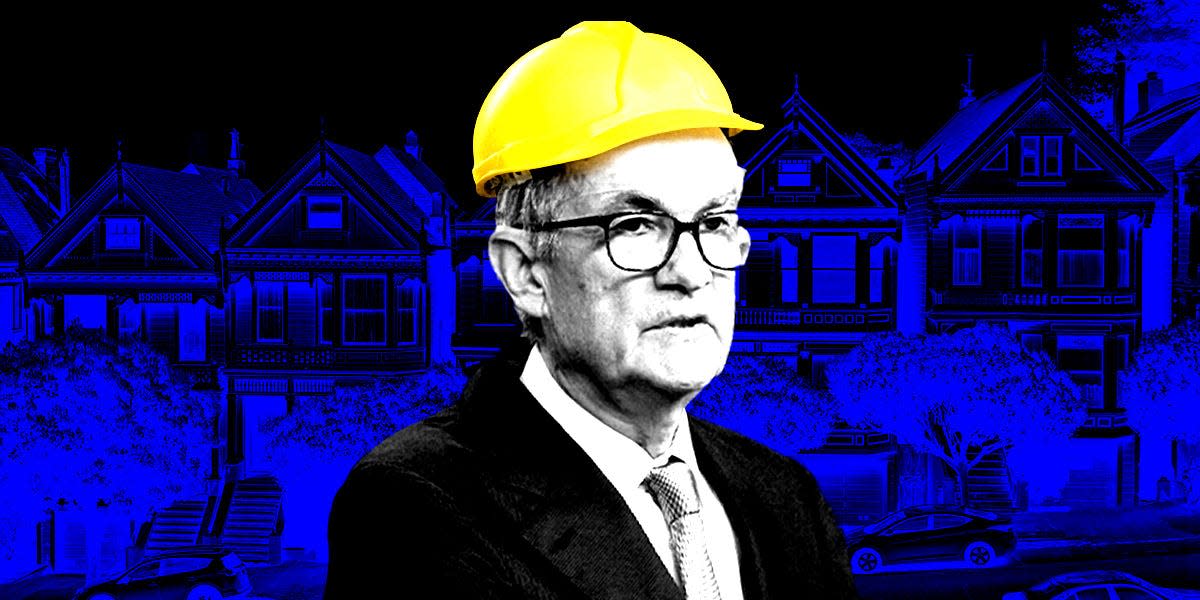Don't get your hopes up about the housing market

Economists expect an interest rate cut in September, which has big implications for housing.
Lower rates would likely boost home construction.
But in the short term, rate cuts could boost demand, sending prices even higher.
Federal Reserve chair Jerome Powell strongly hinted that interest rates are likely coming down soon during his much-anticipated remarks on Friday morning at the annual gathering of central bankers in Jackson Hole, Wyoming.
Markets and many economists believe it's all but certain the Fed will cut rates in September for the first time since post-pandemic supply chain disruptions sent prices soaring, as inflation appears under control and the job market weakens.
One of the most painful ways higher interest rates have impacted Americans is through higher housing costs. The combination of high borrowing costs and skyrocketing home prices and rents — caused by a housing shortage — has created an enduring housing affordability crisis.
But the impact of lower rates on affordability is complicated. On the one hand, lower borrowing costs would likely make mortgages cheaper for buyers and encourage builders to construct desperately needed new homes. But in the short term, a rate cut could trigger a rush of buyers to enter the market, overwhelming any new supply and driving up competition and prices. A rate cut "would probably result in more competition because demand would grow more than supply would," Daryl Fairweather, chief economist at Redfin, told Business Insider.
And borrowing costs for homebuyers likely won't come down a whole lot.
"Although lower mortgage rates may bring some modest relief, a material improvement to affordability conditions remains far off in the distance," Wells Fargo economists wrote in a recent report. "We expect a modest decline in financing costs over the next several years, but the 30-year mortgage rate should remain well above the low rates registered as recently as 2021."
As mortgages get a bit cheaper, which has already begun to happen, prices are predicted to rise in the shorter term. Most major forecasts expect home prices will be between 3.8% and 6.1% higher at the end of this year than they were last year. We're seeing this play out in other countries: In the UK, demand for homes has risen quickly since the Bank of England cut interest rates on August 1 for the first time in four years.
But rate cuts would also spur new home construction, as builders respond to higher demand and lower borrowing costs for acquisition and construction loans. That's key to solving the housing crisis, which was largely caused by underbuilding since the Great Recession. Lower rates are a prerequisite for greater affordability in the long run.
"Even with a single rate cut, it moves many rental projects across the country that were on the edge of feasibility now become feasible, and many homebuyers who otherwise couldn't quite make the numbers pencil all of a sudden can," Ben Metcalf, managing director of the Terner Center for Housing Innovation at UC Berkeley, told Business Insider.
Building the millions of new homes that US buyers and renters need won't happen overnight. On top of high borrowing costs, builders are struggling with a severe shortage of construction workers and high building material costs.
It's not totally clear how many homes the country is short of, but the deficit is likely in the millions. Zillow estimates the shortage is around 4.5 million homes, while Realtor.com estimates a shortage of 7.2 million homes. While lower rates are no panacea, they're welcome.
"It's going to be a long time before we get enough supply out there again so that prices are dropping," Metcalf said. "We're way far away from that. I think we're still just trying to dig out."
Are you struggling to afford a home? Reach out to share your story with this reporter at erelman@businessinsider.com.
Read the original article on Business Insider
